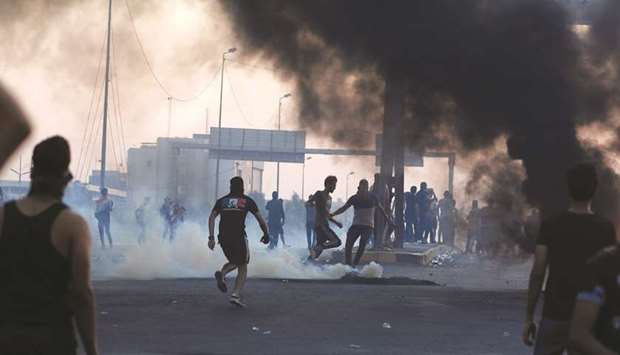Anti-government protests raged for a fifth day in Iraq yesterday, with at least 100 deaths reported in clashes between demonstrators and security forces.
Since Tuesday, thousands have taken to the streets of several areas in oil-rich Iraq to protest against corruption, lack of jobs and poor services – in particular access to electricity and clean water.
The latest deaths included four people who were killed yesterday when security forces opened fire to disperse renewed protests in the capital of Baghdad, witnesses said.
Security forces opened fire at around 200 protesters who gathered at the road linking Falastin Street with Tayeran Square in eastern Baghdad, they added.
The protests, largely led by young people, were renewed at the weekend after a two-day-old curfew in Baghdad was lifted early yesterday.
The protesters set fire to tyres and security forces were chasing them, according to witnesses.
Elsewhere, angry protesters torched the offices of political parties in the southern province of Dhi Qar, witnesses said.
Other demonstrators gathered outside the building of the provincial council in Babil in central Iraq, chanting anti-government slogans. At least 100 people, mainly demonstrators, have been killed in the anti-government rallies across Iraq since Tuesday, the independent High Commission for Human Rights, said.
Ali al-Bayati, a member of the commission, said more than 4,000 other people have been injured in the violent unrest.
Parliament speaker Mohamed al-Halbousi and his two deputies met with a group of protesters yesterday to listen to their demands. Later, he said the legislators recommended to the government to halt a crackdown on informal housing across the country until alternative dwellings are provided.
Al-Halbousi also unveiled a recommendation to appoint all employees working on contracts at the state institutions.
So far, there has been no reaction from either the government or the demonstrators.
The parliament failed to hold a session on Saturday to look into the protesters’ demands.
On Friday, Prime Minister Adel Abdel-Mahdi vowed to respond to the public’s “rightful demands,” but said people must return to their normal lives.
The state had no “magic solutions,” he said.
Moqtada al-Sadr, the cleric whose coalition won the largest number of seats in last year’s parliamentary elections in Iraq, has called on the government to resign. The protests come one year after Abdel-Mahdi took office in Iraq, which is still grappling with a lengthy US-backed military campaign against the Islamic State extremist group.

Demonstrators disperse as Iraqi security forces use tear gas during a protest after the lifting of the curfew, following four days of nationwide anti-government protests that turned violent, in Baghdad, yesterday.
